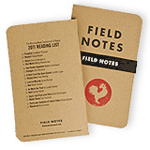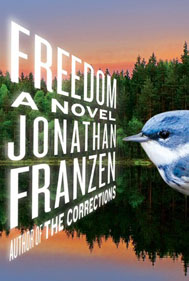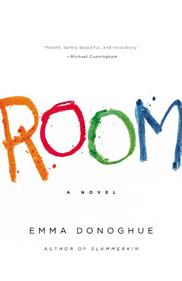-
March 21, 2011
Quarterfinals
-
Commentary by
Kevin Guilfoile & John Warner
-
Today’s Winner:
1Freedom
Kevin: I think the weirdest episode in Freedom is the scene where Walter takes his aging rock star/college friend Richard Katz to a Bright Eyes show. I put the book down for a minute and said to my four-year-old, “Seriously?” Even if you wanted to name a rock band just to check off a cultural touchstone of 2004, Bright Eyes would be an odd choice. Did I miss the scene in The Corrections when Evan Dando stops by with a Christmas turkey?
And it doesn’t come casually either. Nearly-50-year-old Walter, it turns out rather unexpectedly on page 367, is a huge Bright Eyes fan and Conor Oberst gets more backstory exposition than some of the major characters. Strange as it all is, the reason for it all is to dramatize Richard’s alienation from modern music in particular and young people in general. He describes the emo kids in the club as:
…being left to themselves to ritually repudiate, for an hour or two on a Saturday night, the cynicism and anger of their elders. They seemed, as Jessica had suggested at the meeting earlier, to bear malice toward nobody. Katz could see it in their clothing, which bespoke none of the rage and disaffection of the crowds he’d been a part of as a youngster. They gathered not in anger but in celebration of their having found, as a generation, a gentler and more respectful way of being. A way, not incidentally, more in harmony with consuming. And so said to him: die.
Oberst took the stage alone, wearing a powder blue tuxedo, strapped on an acoustic, and crooned a couple of lengthy solo numbers. He was the real deal, a boy genius, and thus all the more insufferable to Katz. His Tortured Soulful Artist shtick, his self-indulgence in pushing his songs past their natural limits of endurance, his artful crimes against pop convention: he was performing sincerity, and when the performance threatened to give sincerity the lie, he performed his sincere anguish over the difficulty of sincerity.…[Katz] felt like the one stone-sober person in a room full of drunks, the one non-believer at a church revival. He was pierced by a homesickness for Jersey City, its belief-killing streets. It seemed to him he had some work to do there, in its own splintered niche, before the world ended entirely.
Katz recognizes that he and others of his generation used irony as both a shield from and a weapon against their parents, whom they saw as being naïve or stupid or delusional and all the other things every generation of kids thinks about their parents. And now that he is old and the irony has turned to cynicism, he was watching young people use sincerity as a weapon/shield against his generation. Never explicitly stated in all of this, of course, is that Katz and Walter and especially Patty are so alienated from sincerity that they can barely communicate with each other. (This is another reason for the autobiography conceit: Patty is incapable of telling anybody what she really feels—the only way she can approach the truth is to write it down in the third person in a journal she doesn’t expect anyone will ever read.) Even Walter’s appreciation of the achingly earnest Bright Eyes is perceived, by Richard and so by us, as being insincere.
 Buy anything from Field Notes from now until the end of the ToB and receive a special “reading list” memo book free, while they last. Use coupon code ROOSTER.
Buy anything from Field Notes from now until the end of the ToB and receive a special “reading list” memo book free, while they last. Use coupon code ROOSTER.I’m not a Boomer but a member of the equally ironic—if not more so—Gen X, and I recently received an email from a (presumably younger) reader who told me he enjoyed one of my novels, but then implored me to stop using metaphors and similes. He wanted me to stop saying what things were like and just say what they were. I couldn’t help but think of this scene. I also couldn’t help but think how popular music has moved so much farther down sincerity road since the last decade. Maybe the best example is Cee Lo Green’s “Fuck You,” which may have broken ground for the casual way it drops the F-bomb in a mainstream pop song, but in terms of total guilelessness has far more in common with Buddy Holly’s “Peggy Sue” than it does John Lennon’s “Jealous Guy.” Ain’t that some shit.
I don’t want to make too much, or anything at all really, of Franzen’s friendship with David Foster Wallace, but this very theme—that the culture of irony has made honest communication between human beings almost impossible—appears throughout Wallace’s work. Franzen and Wallace paint with very different brushes, obviously, but it was interesting to read Franzen (on the eve of the publication of Wallace’s unfinished The Pale King) dealing with a similar subject.
John: I did not particularly enjoy The Corrections. For the most part, Franzen seems to hold those characters in disdain, and the stance of the book is that they well-deserve the thrashing they received. In attitude, if not form, it is a cynical book in the vein of the great cynics of the postmodern era like Don DeLillo or Thomas Pynchon, a book that accepts and makes art out of mankind’s fall. It’s been 10 years since I read the book, but while I remember some moments of illumination and understanding, I don’t recall there being much hope.
Freedom holds many similarities to The Corrections, particularly in terms of style, but here, after putting his characters through the wringer, he decides to offer some measure of redemption and solace to Patty and Walter and their children. They come out the other side not exactly triumphant, but at least OK. Sarah Manguso judged the conclusion deeply satisfying in the opening round. But a lot of readers seemed to feel that it was a kind of betrayal to the book as a whole, that Franzen had copped out by saving these characters from themselves.
As you note, it’s hard to draw a line between David Foster Wallace and Jonathan Franzen with anything other than the world’s most speculative pen, but looking at the differences between The Corrections and Freedom, I can’t help but wonder about the affect Wallace might have had on Franzen. Perhaps at that Bright Eyes concert, Franzen is Katz, but in looking around at Walter and all those kids in a state of appreciation, he may have been sufficiently curious to try sincerity on for himself. It wouldn’t be surprising that it doesn’t fit perfectly because it takes a lot to ignore the reality of a world that usually seems indifferent, even in the face of people trying hard to do the right thing.
The new sincerity might be alive in things like the music of Conor Oberst, the films of Wes Anderson, or The Daily Show, where they believe that truth actually matters and use irony as a tool to expose hypocrisy and reaffirm their values, but it’s hard to know if they’re winning, or even what we’re fighting against.
It’s been reported that The Pale King is Foster Wallace’s novel about boredom, which, if you talk to people like my students at Clemson University, is a bit of an epidemic. During our class discussion of Super Sad True Love Story, I came to understand that their smartphones already have reached apparat status, as they’re never turned off and are constantly employed to combat any potential moments of boredom. Many of them report reflexively turning to their phones during class, or while studying, or any other activity that lacks sufficient stimulation. The remedy for boredom is distraction via text message, or Twitter, or Facebook. But in The Pale King, D.F.W. apparently sees boredom a different way. According to one of the notebooks found in his materials from which The Pale King has been assembled, he says this:
Bliss—a-second-by-second joy and gratitude at the gift of being alive, conscious—lies on the other side of crushing, crushing boredom. Pay close attention to the most tedious thing you can find (Tax Returns, Televised Golf) and, in waves, a boredom like you’ve never known will wash over you and just about kill you. Ride these out, and it’s like stepping from black and white into color. Like water after days in the desert. Instant bliss in every atom.
Just as with Infinite Jest, David Foster Wallace seems well ahead of the rest of us in peeking around the curve. We’re apparently more anxious than ever and Wallace is ready to lead us from the wilderness by telling us to tune in, turn off, and drop out.
Kevin: Room, on the other hand, is all about irony of a different sort. The novel’s extra-narrative tension—that is, apart from the kidnapping plot—concerns the distance between what the narrator, as a five-year-old who’s lived his entire life in one room, doesn’t know, and what we, adults reader living in the world, do. His earnestness isn’t a weapon or a shield against anything. He is sincerely sincere, which sets him apart from all of us.
John: Of course we experience the irony because we know how wrong Jack is about his own circumstances. It’s a clever narrative trick, but it has its limitations and I tend to be in the Dellinger crowd when it comes to Jack’s narration. My first try at the book I was repelled prior to finishing the free sample on the Kindle. Later, following its inclusion in the tourney, I scored a hard copy via my mother and powered past some initial annoyance to get reasonably into it. Donoghue does a good job creating a plausible rationale for Jack’s precocity and verbal manner (he has, after all, spent his entire life in the company of an adult), but still, periodically it bugged me. I’m not sure I think the book would be more interesting if we were allowed into Ma’s point of view, but the choice of Jack carries a potential turn-off for some readers.
Kevin: And with Room hitting the showers, we have a shakeup in our Zombie rankings. If the Zombie Round were held today, Room and Skippy Dies would return to battle the semifinalists.
Finkler v. Goon Squad tomorrow. Be here.
Kevin Guilfoile is the author of two acclaimed novels, Cast of Shadows and The Thousand, which have been translated into more than 20 languages.
John Warner’s novel, The Funny Man, will be released late September of this year by Soho Press. For the time being, he teaches at Clemson University.

















